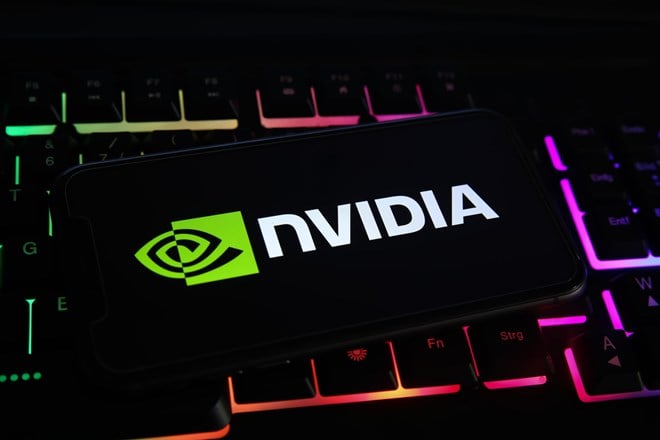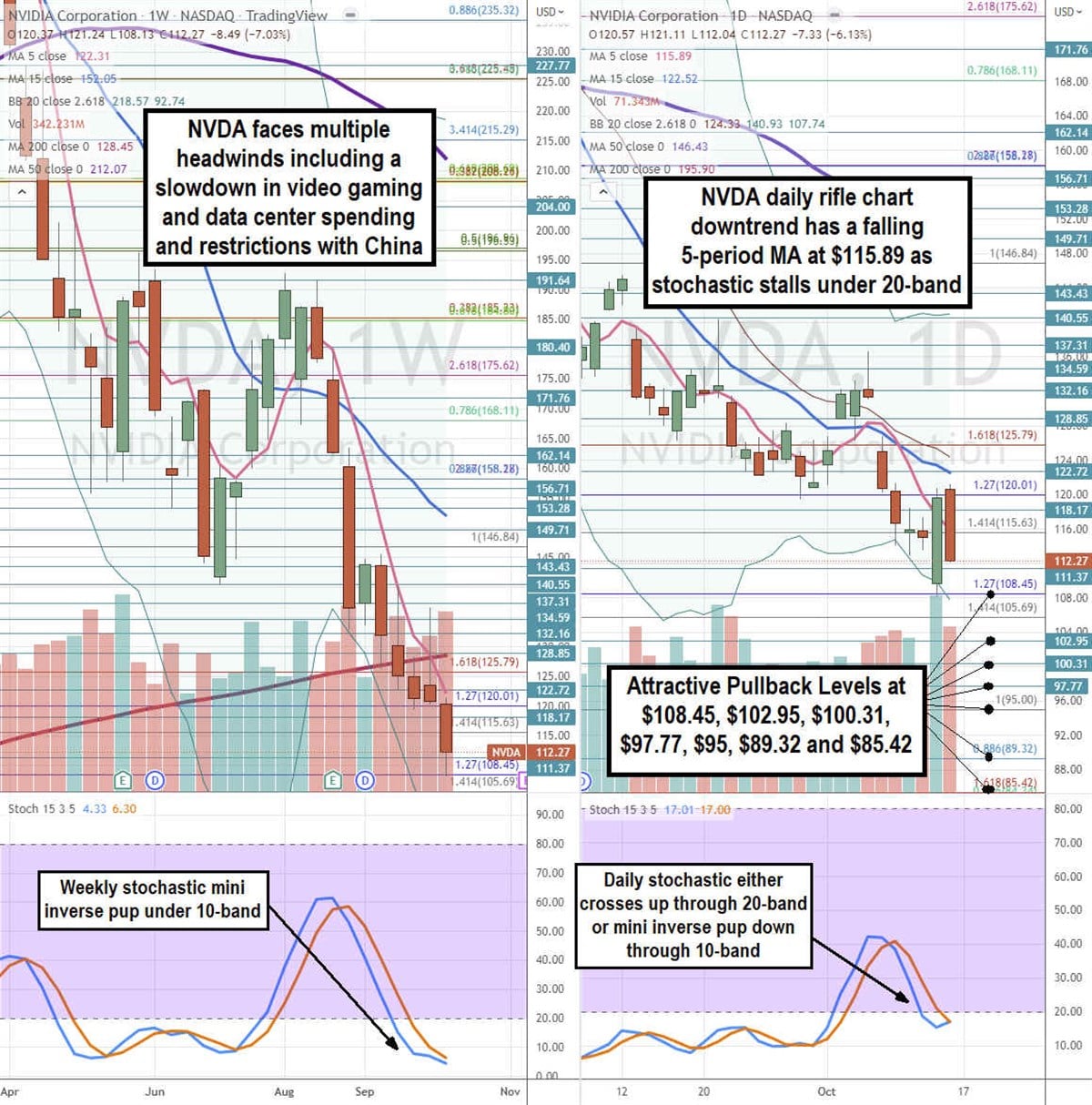 What a difference a year makes. Just less than a year ago, graphic semiconductor chip supplier NVIDIA (NASDAQ: NVDA) stock was riding high in the $340s with the underlying business firing on all cylinders. Total revenues grew 46% to record levels. Its video gaming segment saw sales grow 31% to $3.62 billion in sales and data center demand including artificial intelligence (AI) was off the charts as the segment saw a jaw-dropping 83% growth spike in sales to $3.75 billion. Bitcoin was hitting records levels in the high $60,000s, and the Company was smoking all analyst estimates with each record-breaking earnings release in 2021. Nvidia stock was a darling of Wall Street and the sentiment was very bullish. The good times were still very good heading into 2022.
What a difference a year makes. Just less than a year ago, graphic semiconductor chip supplier NVIDIA (NASDAQ: NVDA) stock was riding high in the $340s with the underlying business firing on all cylinders. Total revenues grew 46% to record levels. Its video gaming segment saw sales grow 31% to $3.62 billion in sales and data center demand including artificial intelligence (AI) was off the charts as the segment saw a jaw-dropping 83% growth spike in sales to $3.75 billion. Bitcoin was hitting records levels in the high $60,000s, and the Company was smoking all analyst estimates with each record-breaking earnings release in 2021. Nvidia stock was a darling of Wall Street and the sentiment was very bullish. The good times were still very good heading into 2022.Abrupt Reversal of Fortune
Fast forward 11 months later October 2022, and the previous tailwinds have reversed into headwinds as investment sentiment also took a complete reversal. The stock has fallen (-62%) for the year having just made 52-week lows at $108.13. The Wall Street darling turned into a pariah. The video gaming segment continues to lose steam as sales collapsed (-33%). Data center sales remain strong, but investors are waiting for that shoe to drop following earnings warnings from Advanced Micro Devices (NYSE: AMD), Marvell Technologies (NASDAQ: MRVL), Western Digital (NYSE: WDC), and Intel (NASDAQ: INTC). The U.S. implemented A.I. chip restrictions on sales to China, which will mean at least a $400 million hit to the Company’s bottom line. The U.S. Federal reserve is hell bent on slowing down the economy with round after round of aggressive rate hikes. Supply chains are clearing up, but demand is drying up as well. Inflation is still prevalent as indicated by the September headline CPI of 8.2%.
The Reversal
On Aug. 24, 2022, NVIDIA released its fiscal second-quarter 2023 results for the quarter ending July 2022. The Company reported an earnings-per-share (EPS) profit of $0.51 excluding non-recurring items versus consensus analyst estimates for a profit of $0.52, a (-$0.01) miss. Revenues grew 3% year-over-year (YoY) to $6.7 billion matching analyst estimates. Data Center revenues rose 61% YoY to $3.81 billion. Gaming revenues fell (-33%) YoY to $2.04 billion. Professional Visualization fell (-4%) to $496 million. Automotive and Robotics rose (45%) to $220 million. There is still $11.93 billion remaining of the share buyback program into December 2023. Gross margins fell to 45.9% from 67.1% in the year ago period. The Nvidia Grace superchip is being used by leading computer makers including Dell Technologies (NYSE: DELL), and Hewlett Packard Enterprise (NYSE: HPE), Lenovo (OTCMKTS: LNVGY), and Supermicro. NVIDIA CEO Jensen Huang commented, “Accelerated computing and AI, the pioneering work of our company, are transforming industries. Automotive is becoming a tech industry and is on track to be our next billion-dollar business. Advances in AI are driving our Data Center business while accelerating breakthroughs in fields from drug discovery to climate science to robotics.”
Downside Guidance
NVIDIA lowered fiscal Q3 2023 revenue guidance to come in the range of $5.78 billion to $6.02 billion versus $6.92 billion consensus analyst estimates. Weakness is attributed to the Gaming and Professional visualization segments which are expected to decline sequentially as OEMs and channel partners reduce inventory to match demand and prepare for its next generations of product launches. Data Center growth is expected to continue its sequential growth as well as the recovery in Automotive. Non-GAAP Q3 gross margins are expected between 61.9% to 62.9%.
Silver Lining
Nvidia is launching its largest wave of new products in its history in the second half of the year. The new product cycle should mitigate some of the slowdown and could be the reason for the current quarter slowdown. As mentioned, the Gaming and Professional Visualization customers are clearing out inventory levels to make way for the next-gen product launches. Much of the slowdown could be a result of buyers delaying purchases to spend in the new product cycle. The U.S. restrictions on its A.I. chips to China doesn’t take effect until calendar year 2H 2023 and things could change before the enactment as China’s economy is falling quickly. The market may be overshooting on the downside as the bar gets set really low heading into fiscal Q3 2022 earnings.

Attractive Pullback Levels on the Charts
Using the rifle charts on the weekly and daily time frames provides a precision view of the price action playing field for NVDA stock. The weekly rifle chart has been in a steep downtrend selling off during eight of the past nine weeks. Shares made an initial low attempt near the $108.45 Fibonacci (fib) level. The weekly 5-period moving average (MA) resistance is falling at $102.81 followed by the weekly 15-period MA at $152.05. Shares collapsed through the powerful weekly 200-period MA at $128.45. The weekly lower Bollinger Bands (BBs) sit at $92.74. The weekly stochastic formed another bearish mini inverse pup below the 10-band. By all accounts, the weekly is a very bearish chart that has yet to form a current weekly market structure low (MSL) buy trigger. The daily rifle chart formed a MSL trigger on a breakout through $121.11 if the $108.45 low holds support. The daily rifle chart attempted to bounce but fell right back down through the daily 5-period MA at $115.89 as the daily 15-period MA continues to fall at $122.52. The daily lower BBs sit at $107.74. The daily stochastic initially tried to bounce through the 20-band but is now stalled. The daily lower BBs sit at $107.74 and upper BBs at $140.93. Attractive pullback levels sit at the $108.45 fib, $102.95, $100.31, $97.77, $95.00 fib, $89.32 fib, and the $85.42 fib level.